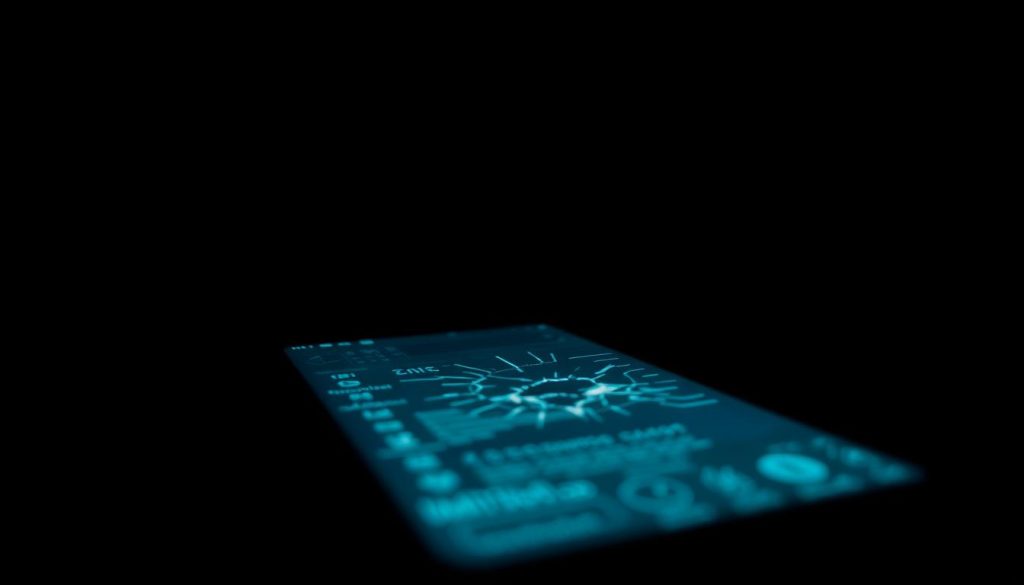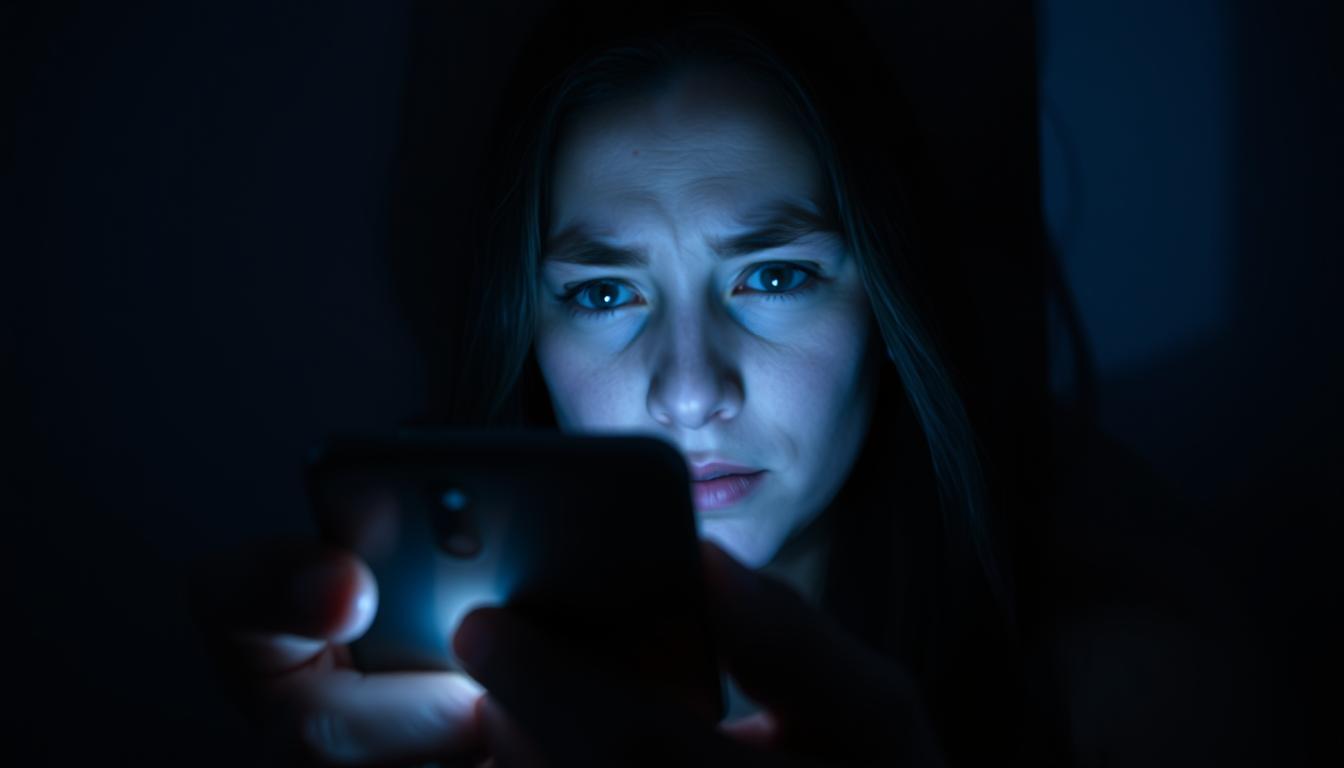Who is watching me through my phone?
In today’s tech-driven world, phone surveillance worries many. Smartphones, once just for calls and texts, now open doors to privacy breaches. Spyware can sneak into devices, making people’s lives a subject of scrutiny without their knowledge.
Edward Snowden’s revelations about NSA surveillance have raised more concerns. These fears are not just about government spying but also about daily life surveillance. As our personal info becomes more exposed, knowing how to protect our phones is key.
Key Takeaways
- Phone surveillance is a critical issue in the digital age.
- Spyware can infiltrate smartphones, leading to severe privacy invasions.
- Notable events, like Snowden’s revelations, broaden awareness of surveillance risks.
- A hacked phone poses significant risks to personal information and security.
- Understanding these threats is vital for safeguarding your privacy.
The Threat of Phone Surveillance
Phone surveillance is a big threat to our personal security. It happens through phone hacking, which takes advantage of weak spots. Cybercriminals use spyware and malware to get into our devices and steal our private info.
Phone cameras are easy targets because they can be used without our permission. This means our photos and videos can be taken without us knowing.
As technology gets better, so do the ways hackers find to get around our defenses. This puts us in danger. Sometimes, we might use apps that secretly track our data, which is a huge privacy risk. We need to protect our phones from these new threats.
Understanding Spyware and Its Functions
Spyware sneaks into devices without being noticed. It lets hackers watch what users do. Knowing about spyware definition is key to keeping personal info safe.
The functions of spyware are sneaky. It can track where you are, steal passwords, and listen in on your calls. Some spyware lets hackers control your device from afar. This is why it’s important to protect your digital world.
Knowing how spyware works is vital today. With the right info, you can shield your personal data. This helps keep your digital life safe from harm.
Red Flags Indicating Someone is Watching You
It’s important to know the signs of phone surveillance. Look out for smartphone indicators that show if your device is being watched. Be alert to any changes or behaviors that seem off.
Strange Camera Behavior
One sign of surveillance is when your camera turns on by itself. If your camera starts working without you asking, it’s a big privacy concern. Also, watch for strange media files in your gallery, as they might show someone has accessed your phone.
Background App Activity
Keep an eye on your phone’s data use. If it’s using more data than usual, it could mean someone is watching you. Check for apps that run in the background without your permission. This is a clear sign of surveillance.
Excessive Battery Drain
Fast battery drain is a big issue, even on new phones. If your battery is dying quickly, it might be because spyware is running in the background. This is a common sign of spyware trying to gather your personal info.
Who is watching me through my phone?
Phone spying involves many players. Cybercriminals aim to steal personal data for money, using advanced methods. This makes them a big threat to our online safety.
Intimate partners also misuse technology, causing emotional harm. This can lead to trust issues and privacy concerns.
Government agencies use powerful tools for surveillance. This raises questions about how much control they have over us. Every time we use our phones, we’re in a silent fight for privacy.
Stalkerware is another danger, allowing constant monitoring. Sharing personal info on social media increases our vulnerability. Knowing who watches us is key to staying safe online.
Potential Actors in Phone Surveillance
In the world of phone surveillance, many groups play important roles. Cybercriminals use advanced methods to get into devices and steal personal info. They find ways to get past security, which can lead to identity theft or data breaches.
Stalkers also play a part, using spyware to watch their targets. This is a big privacy and safety issue, making victims feel trapped. It shows how easy it is for someone to invade your privacy.
Government surveillance adds another layer of complexity. Authorities say they monitor to keep us safe. But, it raises big questions about our privacy, as our data can be tracked.
Data brokers are another big problem. They collect our info and sell it to others for marketing. This makes our privacy even worse, as we don’t know how our data is used.
How Cybercriminals Exploit Vulnerabilities
Cybercriminals use many ways to find and use security weaknesses in mobile devices. They often use phishing scams to trick people into sharing personal info. This can lead to big problems with device security.
They also use public Wi-Fi networks to get into devices. Many people connect to these networks without thinking, which puts their phones at risk. Hackers can then use hacking techniques to put malware on devices through links or apps.
Malware can be installed quickly, and users might not even know it’s happening. It’s important to understand these tactics to keep personal info safe and protect against cyber threats.
The Role of Apps in Data Collection
Smartphones are now a big part of our lives. It’s important to know how they collect data. Apps help us do many things, but they can also take our privacy. Users often give apps too much access without knowing the risks.
Developers can change how they use our data anytime. This makes it hard for us to keep track of our privacy.
Permissions Granted to Apps
When we install apps, we give them permission to do things. They might need to see our contacts or where we are. But sometimes, they ask for too much.
For example, a flashlight app might want to use our camera. This makes us wonder if they’re collecting too much data.
Data Handling Practices of Major Companies
Big companies say they care about our privacy. But their terms of service can let them share our data. This means our info might be used in ways we didn’t agree to.
It’s key to check what permissions we’ve given apps. Knowing how companies handle our data helps us protect our privacy.
Common Symptoms of a Hacked Phone
Spotting hacked phone symptoms early is key to preventing harm from unauthorized access. Look out for malware indicators that show your phone might be compromised. Signs like your phone restarting on its own or shutting down unexpectedly are red flags.
Notice if your phone’s storage is filling up fast. This could mean hidden apps or files installed without your permission. Keep an eye on data usage, as unknown apps using a lot of data might be a sign of trouble. Also, watch for signs of infiltration like your battery draining quickly or your phone acting strangely.
Check your apps regularly to see if any are new or suspicious. If you see apps you don’t recognize on your home screen, investigate. If your phone’s settings change suddenly or it acts strangely, it’s time to take action.

Protecting Your Phone from Privacy Invasion
Smartphone use is growing fast. Keeping your privacy safe is more important than ever. Using good phone security tips can protect your data from unwanted access. It’s key to use antivirus software, keep your software up to date, and manage app permissions.
Utilizing Antivirus Software
Good antivirus software is your first defense against malware and spyware. It scans your device for threats and stops them. Make sure to update it often to keep it working well against new threats.
Regular Software Updates
Keeping your phone’s OS and apps updated is essential for security. Developers often release updates to fix security holes. Turning on automatic updates means your phone gets these fixes quickly, keeping it safe.
Managing App Permissions
Being careful with app permissions is important to protect your data. Think about which permissions you give and change them if needed. This helps keep your personal info safe from unwanted access.
Legal Implications of Phone Surveillance
The laws about phone surveillance are complex and sometimes confusing. There are surveillance laws to protect people from being watched without permission. But, these laws are not always enforced well.
As technology gets better, the laws struggle to keep up. This means that illegal surveillance can happen without anyone being held accountable.
In places like Singapore, privacy rights are key to the legal system. They help protect personal info from unwanted access. But, governments and companies sometimes ignore these rights, making it hard to talk about privacy in the digital world.
Companies have a big role in handling user data. They collect a lot of info, so they must follow strict data protection laws. If they don’t, they could face legal trouble. This shows why it’s important for companies to be open about how they use our personal data.
Signs of Malware on Your Device
It’s important to know if your phone has malware. This helps keep your personal info safe. Look out for signs that your device might be at risk. Knowing these signs helps you act fast to protect your phone.
Analyzing Data Usage Patterns
Big increases in your data use could mean trouble. If your phone bill shows a lot of extra data, check it out. Malware uses your internet to send data, which can cost you money.
Watching your data use helps you spot malware. It also shows how your phone should act normally.
Checking for Unfamiliar Applications
Look at the apps on your phone regularly. If you find apps you don’t remember getting, it might be malware. Hackers hide malware in apps to avoid being caught.
Knowing what apps you have helps you find malware. It’s key to keeping your phone safe.
Safety Tips for Protecting Your Privacy
In today’s digital world, keeping your personal info safe is key. It’s important to follow good privacy tips to protect your data. Here are some steps to keep your privacy safe while online.
Avoiding Public Wi-Fi Risks
Public Wi-Fi can be risky for your data. Don’t use it for sensitive stuff like bank info or personal accounts. If you must use public Wi-Fi, turn off file sharing and turn on your firewall to stay safe.
Using VPNs for Secure Browsing
A Virtual Private Network (VPN) adds security by encrypting your internet. It hides your IP address, making it hard for others to track you. A good VPN service keeps your data safe and secure online.
The Future of Privacy and Smartphone Security
Smartphone security trends are changing fast. We rely more on our phones every day. This makes keeping our data safe more important than ever.
New tech like artificial intelligence and better encryption will help protect our info. This way, our personal data stays safe from threats.
Privacy groups are pushing for better laws to protect us. Laws like the GDPR in Europe are being looked at in places like Singapore. These laws aim to make companies more open and responsible with our data.
Cyber threats are getting smarter, so we need better ways to protect ourselves. It’s key to stay up-to-date with new dangers and take steps to keep our info safe. The future of privacy will depend on tech, laws, and people who care about their digital safety.





